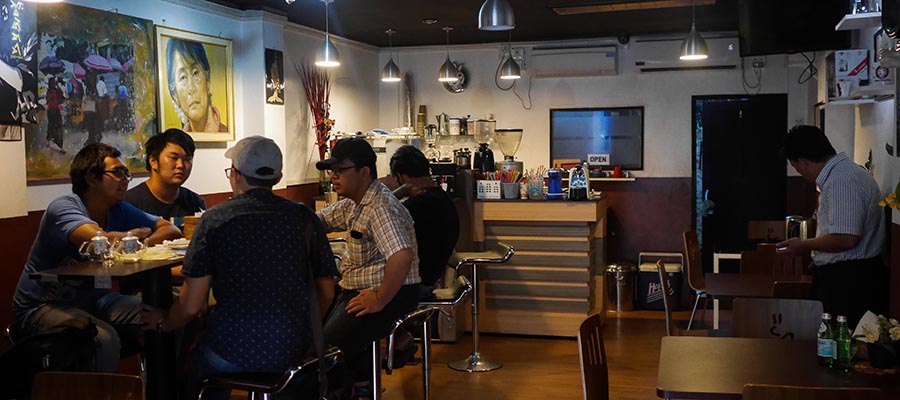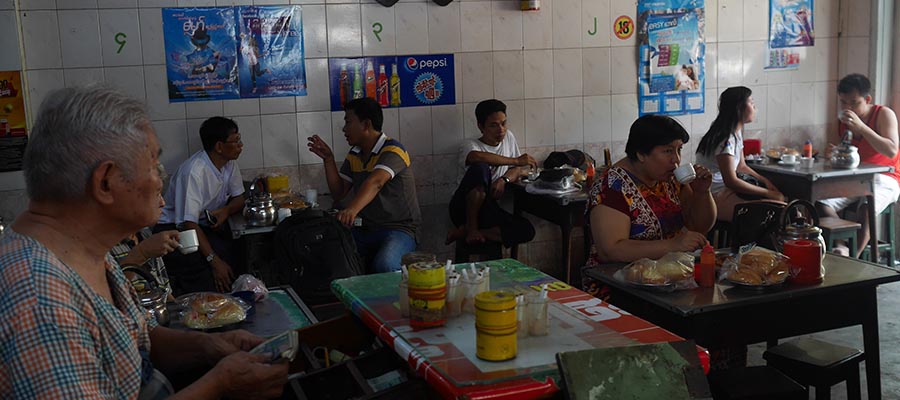RANGOON — It is 2:30 a.m. and I am on my way home after a night out with friends when I find myself watching the teashop boys on my street set up tables with their half-open eyes.
The teashop’s soft light is bright enough to see one man baking naan. An older man who prides himself on taking charge of neighborhood security sits with a cup of tea, dressed in multiple layers. The shop’s empty tables will soon be full of locals conversing over tea and fresh-baked naan.
The scene reminds me of home, and comes back to me every time I am away. In a country where tea culture has reigned dominant for decades, these shops occupy nearly every corner of commercial capital Rangoon’s streets. However, in recent years, Rangoon has witnessed an emerging coffee scene among its middle class and expatriate community that challenges these existing shops.
Foreigners and Burmese can be seen chatting over coffee in air-conditioned lounges decorated with local paintings. Free Internet and indie music draw in the younger generation, while all ages can be spotted in plastic stools at low tables, sipping traditional Burmese tea in the heat outside.

Many foreign coffee chains—mostly brands from neighboring Thailand, like Black Canyon, True Coffee and Chao Doi—have opened branches in Rangoon, introducing a new coffee culture to the country.
Last year, Australian coffee chain Gloria Jean’s opened its first branch in a Rangoon’s new commercial complex Myanmar Plaza, built by a Vietnamese company in late 2015. Its second branch opened recently at the city’s newest mall, Junction City. American brand The Coffee Bean & Tea Leaf opened at the city’s new international airport.
While specialty coffee gains traction, the beverage itself is not new to the people. According to the UN Food and Agriculture Organization (FAO), foreign missionaries initiated coffee growing in the country’s Tenasserim Division in 1885. Roman Catholic missionaries introduced Arabica coffee in 1930 to southern and northern Shan State, and Pyin Oo Lwin, the FAO stated.
Rangoon’s traditional Burmese coffee shops like Latt Yway Sin are first wave cafés that brew mass-market coffee, but others like Café Aroma began introducing Western-style brews in the early 2000s.
Ko Ngwe Htun, a Burmese entrepreneur and owner of Genius Coffee, tries to introduce Rangoon residents to third wave cafes, which offer specialty and single-origin coffees that are not yet commonplace in the commercial capital.
“Cafés are trendy and popular in many other countries. When this culture arrived here, locals were ready to adapt,” he told The Irrawaddy.
When Singaporean couple Javier Phua and Melissa Koh first moved to Rangoon in late 2013 and opened Easy Café on Boyarnyunt Street, there was only one other café nearby called Santino. Four years later, there are at least four cafés on the same street, including Craft by the Singapore-based chain Killiney.
For Javier, coffee is universal but cafés are more than just a place to have a good cup of coffee. They are a “third place” outside of the home and office.
“It’s about the whole coffee experience, from the staff you interact with to the decorations, aesthetic, and ambiance, to the music being played,” he told The Irrawaddy.
“Basically it’s a whole sensory experience encompassing sight, taste, smell and sound. I think that’s what cafés contribute to society,” he added.
Both Ko Ngwe Htun and Javier believe that the most important element to attract return customers to a place is the entire experience.
“At the end of the day, people need to feel an emotional connection to a place,” Javier said.

Erina Iwasaki, an expatriate educator and music festival director in Rangoon, endorsed the idea of coffee shops as a third space, saying she patronizes them when she wants a change of scenery or some quiet time.
“Coffee shops are great places to be in between work and leisure. They also help me focus, where at home I tend to let myself procrastinate,” she said, adding that she would go more often if coffee shops were more easily accessible to her.
Burmese local Pan Pan seeks out comfort and Internet access. Living with her family, she doesn’t like to spend the weekends cooped up in her bedroom.
“I spend almost an entire day, or at least half a day, at coffee shops on the weekends,” she said.
She says coffee is an afterthought, and she prefers a quiet space to one where people are carrying on loud conversations, adding that she only frequents traditional teashops for breakfast, not as a space to spend time.
But, teashops play an important role in Burmese communities, serving as a gathering place where many people begin their days, having breakfast and sharing news.
Historically, teashops were more than just a place for food and tea. During the country’s military regime, many discreet political discussions took place there, fearing that these conversations could be overheard elsewhere. Nowadays, people can be heard openly criticizing the government at these shops, which is evidence of a change in the country’s political weather.
Besides politics, the shops also serve as a place for local writers, painters, poets and cartoonists to share and discuss their art.
With increasing globalization, one question is at the forefront. Will these traditional teashops be overtaken by a growing internationally influenced coffee culture?
Genius Coffee’s Ko Ngwe Htun says both places will continue to serve society’s varied tastes.
“The two [cultures] will coexist, Ko Ngwe Htun said. “For teashop goers, cafés may be boring. For café goers, teashops may be too noisy,” he added.
While cafés serve as a third space for some, teashops are an inclusive space for all. While cafes play curated music selections, teashops welcome enthusiastic crowds with soccer matches. Where cafés serve specialty coffee in cozy environments, teashops show TV soaps to working class families.
When I would otherwise find myself standing inside a café unable to decide what to order, a teashop boy shouts a code understood only here for the tea that I like.
Rangoon now has plenty of options when I crave a well-brewed cup of coffee or want to meet with friends, but the teashop on my street will always feel like home.

















